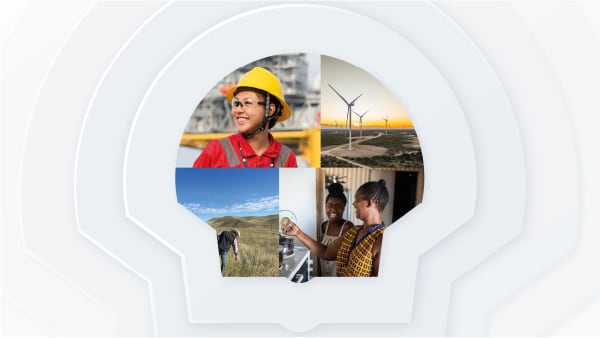Our people
Our people are essential to the development of energy solutions for today and tomorrow. They are key to delivering Shell's Powering Progress strategy and we believe in helping them to develop their skills. We aim to become one of the world's most diverse and inclusive organisations, a place where everyone feels valued and respected.
All metrics throughout this section exclude the employees in portfolio companies, except for the metrics reflecting total employee number by gender and region, percentage of women employees, and certain mandatory training courses.
Employee overview
We employed 103,000 people on a full- or part-time basis at the end of 2023. This compares with 93,000 at the end of 2022 and 83,000 at the end of 2021. The data include people working in Shell subsidiaries, Shell-operated joint ventures and those seconded to non-Shell-operated joint operations, or ventures and associates. The employee numbers for 2021 reflect headcount in the Shell HR system and full-time equivalent numbers for portfolio companies, which maintain their own HR systems. Additionally, Shell businesses utilise contractors on certain projects during the year. For example, in 2023 contractors worked alongside Shell employees in divisions such as Information and Digital Technology.
In 2023
-
Employees
103,000employees at December 31, 2023
-
Countries and territories
>70countries in which we operate
-
Directors
42%women on the Board of Directors
-
Executive Committee
43%women on the Executive Committee
-
Senior leaders
32%women in senior leadership positions
-
Women employees
35%women employees
-
Training
295,000Training days for employees and joint-venture partners
-
Experienced hires
9,209people joined Shell
(38% women, 62% men) -
Graduate hires
460people joined Shell
(40% women, 60% men)
Changes in headcount
In Shell companies, excluding portfolio companies, headcount rose to 84,000 at the end of 2023 from 79,000 at the end of 2022 due to growth in Information and Digital Technology, and Downstream, Renewables and Energy Solutions.
As we continue to implement our Powering Progress strategy, in Shell's portfolio companies which maintain their own HR systems, headcount rose to 19,000 at the end of 2023 from 14,000 at the end of 2022. This was partly driven by acquisitions and growth in Downstream, Renewables and Energy Solutions.
See Note 32 to the "Consolidated Financial Statements" for the average number of employees by business segment.
The table below presents the total employee number by gender and region.
|
|
|
|
|
Thousand |
|---|---|---|---|---|---|
|
2023 |
2022 |
2021 |
||
|
Men |
Women |
Total |
Total |
Total |
Number of employees |
67 |
36 |
103 |
93 |
83 |
Breakdown by region |
|
|
|
|
|
Africa |
2.6 |
1.0 |
4 |
4 |
4 |
Asia |
22.9 |
15.1 |
38 |
32 |
30 |
Europe |
20.0 |
11.1 |
31 |
30 |
27 |
North America |
17.8 |
6.4 |
24 |
23 |
18 |
Oceania |
2.5 |
1.2 |
4 |
3 |
2 |
South America |
1.4 |
0.8 |
2 |
1 |
2 |
The table below presents the number of employees by age group.
|
|
|
Thousand |
||
|---|---|---|---|---|---|
|
2023 |
2022 |
2021 |
||
Under 30 years old |
12 |
11 |
10 |
||
Between 30 and 50 years old |
54 |
51 |
50 |
||
Above 50 years old |
18 |
17 |
17 |
||
|
|||||
The table below presents the distribution of employee contract type, by gender and region.
|
Permanent Contract/Employment at-will [B] |
Fixed-Term Contract |
||||||
|---|---|---|---|---|---|---|---|---|
|
Men |
Women |
Men |
Women |
||||
Number of employees |
54,074 |
28,502 |
941 |
432 |
||||
Breakdown by region |
|
|
|
|
||||
Africa |
4% |
3% |
9% |
18% |
||||
Asia |
37% |
43% |
33% |
37% |
||||
Europe |
32% |
35% |
51% |
41% |
||||
North America |
22% |
15% |
2% |
1% |
||||
Oceania |
3% |
2% |
5% |
3% |
||||
South America |
2% |
2% |
— |
— |
||||
|
||||||||
Shell aims to be an attractive employer to its existing and prospective employees. We offer employees the opportunity to develop their careers within Shell, including rotations across different parts of the business to grow their skills and progress.
In 2023, 11.2% of Shell employees were promoted compared with 14.3% in 2022.
Shell's turnover in 2023 was 5.7%; 4,685 employees left Shell of which 2,669 resigned voluntarily. This compares with 8.5% in 2022, during which 6,630 employees left Shell of which 3,942 voluntarily.
Employee engagement
Insight into employee needs and perspectives enables Shell to continually learn and improve our policies, processes, and practices.
Management regularly engages with employees through elected employee representatives and a range of local formal and informal channels. These channels include webcasts and all-employee messages from our CEO and other senior leaders, as well as town halls, team meetings and site visits by the Board and EC.
In 2023, members of the Board and EC visited certain Shell sites in Canada where they engaged with employees on our strategy and the energy transition. Shell plc's Chair, Sir Andrew Mackenzie, also met with Shell employees on his site visits to the Netherlands, China and Germany.
See "Workforce engagement".
We seek to comply with applicable local laws and regulations, including on working hours. We aim to eliminate discrimination in employment, forced labour and child labour. We respect the right to collective bargaining and freedom of association. Where appropriate, engagements take place with union representatives at asset and country level, as well as with the Shell European Works Council.
Employees have access to senior leaders, local employee forums and employee resource groups. These engagements enable Shell to maintain a constructive employee and industrial relations environment.
Team leadership plays a key role in driving employee engagement. We seek to develop leaders through learning programmes, domestic and international assignments, and project opportunities. In 2023, 22% of team leaders in Shell received access to Shell's leadership learning programme, LEAD. Our mindset and behaviours, which emphasise psychological safety, are at the heart of our leadership programmes.
We aspire to equip our employees with skills and experience through the digital and energy transition. People development is a priority at Shell. Learning and development is part of our organisational culture and budget planning. Training courses are accessible to all employees, either online or in person. In 2023, 295,000 formal training days were delivered to employees and joint-venture partners. This compares with 266,000 training days in 2022.
We aim to equip our employees with the skills they will need for digitalisation and the energy transition, and we have increased the learning offerings available for new skills. In 2023, around 6,900 Shell employees completed courses on topics such as hydrogen production, carbon capture and storage, and energy management. This is an increase from 4,000 in 2022. Where appropriate, we recruit talent externally to add to the skills and experiences of our workforce.

The Shell People Survey
The Shell People Survey is one of the key tools we use to measure employee engagement, motivation, affiliation and commitment to Shell. We believe that increased employee engagement can result in better business performance and improve safety. In 2023, the response rate to the survey was 88% (from 87% in 2022). The average employee engagement score remain unchanged at 79% from the 2022 level, which is top quartile in comparison with external benchmarks. This score suggests that, overall, our people are engaged, enjoy their work and are loyal to Shell. This number excludes scores from our joint-venture partners who participated voluntarily in the Shell People Survey.
Employee well-being
Shell provides competitive remuneration with a range of benefits, such as global minimum maternity leave of 16 weeks and at least eight weeks' paid parental leave for non-birthing parents.
Financial well-being
Shell's remuneration is designed to be market competitive and free from bias. We aim to ensure equal pay for equal work. Through regular benchmarking, Shell's compensation is typically higher than the minimum wage level observed locally, including in countries without legislation on minimum wage. Pay adjustment at Shell is directly linked to performance management. The system is shared transparently with all employees to help them understand how their pay adjustments are made annually. We continue to engage employees transparently and openly about our pay policies to help build understanding, trust, and confidence in our approach.
Flexible work
We seek to build a sense of community and collaboration within Shell's sites where we want employees to feel welcome and valued. By enabling people to balance their work and personal lives, we can help them perform at their best. Our Future of Work guide advises employees and team leaders on hybrid working options. Shell offers to meet both business and personal needs.
Physical, social, and mental well-being
Our goal is to empower our employees to feel their best and perform at their best. We do this by promoting mindsets and behaviours that support good health, by protecting our people from illness by mitigating known risk factors. We do this by using evidence-based tools, and by providing access to timely support and care for those who are injured, ill or struggling.
Interventions to promote mental, physical, and social well-being are delivered via a mix of measures. For example, through the design of our workspaces, through benefits offerings such as gyms and health checks, and through our country-based employee networks, group activities and events. Our global campaigns, such as Care for Self and I'm Not OK, develop individual and team well-being skill sets, to create healthy and psychologically safe working environments, and to nurture a culture of care.
Mental well-being
At Shell we strive to reduce the stigma related to mental ill health through open conversations, global and country-level campaigns, senior leader communications, engagements with elected employee representatives and through our experience-sharing portal for employees. This commitment is underscored by the CEO's signing of the Global Business Collaboration for Better Workplace Mental Health Pledge in January 2023.
Global Mental Well-being Programme
In November 2023, Shell launched its Global Mental Well-being Programme following a successful pilot in 2022. The programme's interventions have a strong focus on developing a workplace culture that supports good mental health, and the voluntary survey enables employees to voice their experience of well-being in Shell. The data are anonymous and provide KPIs to report on progress and to identify opportunities to continually improve employee well-being.
Diversity, equity and inclusion
We have set clear goals for diversity, equity and inclusion (DE&I) and monitor these on a regular basis. Our CEO and EC are accountable for progress. We also continually assess our culture and staff engagement through tools such as the annual Shell People Survey. Detailed information on progress against our DE&I aspirations can be found on shell.com/DEI.
Shell employees and contractors are required to complete two mandatory training courses on DE&I: Conscious Inclusion and Respect in the Workplace. These reinforce expected behaviours for a respectful, inclusive workplace, and build our stance against discrimination and harassment, including bullying and sexual harassment. Employees and contractors are required to take these two courses every two years.
In 2023, our Shell People Survey showed a result of 83 points out of 100 for all questions relating to DE&I. This was unchanged from 2022 and suggests that overall our people feel that Shell is a workplace in which they belong and have equal opportunities to progress and grow. The result indicates that our people believe they are provided with a safe and inclusive work environment. We will continue to focus on improving our DE&I efforts as we strive to improve our result further.
As of December 31, 2023, 89% of Shell employees now have the option to voluntarily declare their gender identity, sexual orientation, race and ethnicity, and disability where relevant and legal, via Shell's HR system. Data from this self-identification initiative (self-ID) allow us to monitor progress against our DE&I aspirations.
Gender
We strive for gender equality and we have signed the World Economic Forum declaration on closing the gender gap in the oil and gas sector. We have also endorsed the Catalyst CEO Champions for Change initiative for the advancement of women, especially those from ethnic minorities, into senior leadership and board positions.
In line with the UK Listing Rules, the Board of Shell plc aims for gender balance on the Board, with at least one senior board position [A] held by a woman. To provide flexibility for periods of change, we aim to maintain the representation of both men and of women at, or above, a minimum of 40%. As of December 31, 2023, women made up 42% of the Board with one senior board position, the CFO role, held by a woman.
[A] Senior board position means Chair, CEO, Senior Independent Director, or CFO.
Over the years, Shell has progressively improved the representation of women on the Executive Committee and in senior leadership roles. The table below shows the representation of women at December 31, 2023. As of January 1, 2024, we have more women than men on our Executive Committee, at 57%.
Level |
2023 |
2022 |
||
|---|---|---|---|---|
Women on Board |
42% |
55% |
||
Women on Executive Committee |
43% |
22% |
||
Women in Senior Leadership roles [A] |
32% |
30% |
||
|
||||
Gender diversity data |
Men |
Women |
||||
|---|---|---|---|---|---|---|
Directors of the Company |
7 |
58% |
5 |
42% |
||
Senior managers [A] |
806 |
66% |
410 |
34% |
||
Employees (thousand) |
67 |
65% |
36 |
35% |
||
|
||||||
Shell seeks to increase the overall representation of women in the organisation. As of December 31, 2023, 35% of Shell employees were women. Of the experienced hires who joined Shell in 2023, 38% were women compared with 40% in 2022. Of the graduate hires who joined Shell in 2023, 40% were women compared with 49% in 2022.
A crucial element of improving gender balance is addressing any gender pay gap and we continue to work towards improvements in this area. We conduct an annual global gender pay equity review using a robust statistical approach. In 2023, countries in this review included Australia, Brazil, Canada, China, France, Germany, India, Malaysia, the Netherlands, Nigeria, the Philippines, Poland, Qatar, Singapore, South Africa, Thailand, Turkey and the UK.
For example, in the UK, we continue to make progress to close the gap. In 2023, the mean gender pay gap of all men and women across all in-scope [A] Shell companies in the UK is -3.7% to 18.7%, compared with 11.7% to 20.7% in 2022.
[A] Shell companies in the UK with 250 or more employees in line with UK government requirements on gender pay gap reporting.
In parallel, the mean gender bonus gap ranged from -11.3% to 57% in 2023. This gap exists for several reasons, including fewer women in senior leadership positions and fewer women in higher-paid specialist roles. More information about the UK gender pay gap at Shell can be found on our website.
Race and ethnicity
We are working to address racial inequity and create an inclusive work environment where everyone feels valued. In 2020, we created the Shell Global Council for Race supported by a 20-member Employee Advisory Board composed of members from a diverse mix of racial and ethnic backgrounds. The council, which is sponsored by the CEO, aims to advance diversity in our workforce so that it better reflects communities where we work and from which we draw talent. The council focuses on the USA, the UK and the Netherlands.
Shell aims to maintain or exceed having at least one Board member from an ethnic minority background, acknowledging that in periods of Board change this balance may not be achieved. As of December 31, 2023, the Board had three members from an ethnic minority group. In addition, one of Shell's EC members identifies as being from an ethnic minority group. In support of the 2023 Parker Review recommendations, Shell aims to achieve 15% ethnic minority group representation in its Senior Management by 2027 [A].
[A] As per the 2023 Parker Review, "Senior Management" refers to EC and senior managers who report directly to them and "ethnic minority" refers to an individual who self-identifies as Asian, Black, Mixed/multiple, or other ethnic minority group, in line with the UK ONS classifications.
Due to local restrictions with ethnicity data collection and reporting, Shell offers employees the option to voluntarily declare their ethnicity via the Self-Identification (Self-ID) initiative [A].
[A] Ethnicity declaration is voluntary and collection of relevant data that is aligned to the UK ONS classifications is not available in all countries.
Improving the employee declaration rate via Self-ID continues to be a priority as it contributes to building and developing a diverse talent pipeline at Shell.
See "Nomination and Succession Committee" for our current talent management and succession process.
Shell has reported on its race and ethnicity ambitions in the USA, the UK and the Netherlands. The graphic below shows the ethnic distribution of Shell employees in the USA as reported to the US Department of Labor.
Employee ethnic diversity – USA
Employee ethnic diversity – UK
The graphic chart above shows the ethnic diversity of Shell employees in the UK based on self-identification data provided by employees. As ethnicity declaration is voluntary, our ethnicity declaration rate is not 100% and all calculations are based on a declaration rate of 83.1% in the UK. The 16.9% of our workforce who have not provided data or have chosen not to declare their ethnicity were not included in our calculations
In addition, Shell in the UK voluntarily publishes its ethnicity pay gap data and the steps it is taking to close the gap annually. This includes a recruitment ambition of 8% Black representation in graduate and experienced hires by 2025, in line with UK society.
See the Shell UK Diversity Pay Gap Report 2023 on shell.co.uk.
In the Netherlands, we are implementing our Ethnic Inclusion Plan which includes initiatives to raise awareness and to promote voluntary disclosure of Self-ID data. In 2023, we also recruited 34 new hires via Shell's Learning Programme for refugee talent in the Netherlands.
Shell also works with key suppliers to ensure they understand our DE&I expectations.
See our website shell.com for more information on our DE&I progress in the UK, the USA and the Netherlands.
LGBT+
We are working to advance lesbian, gay, bisexual and transgender plus (LGBT+) inclusion within Shell and the communities where we work. We promote equal opportunity and aim to create an environment where people feel included, regardless of sexual orientation or gender identity. Our approach reinforces respect for people and provides psychological safety for our LGBT+ employees. Most of our work around LGBT+ inclusion happens at a country level in line with local policies, laws and regulations. Our Global LGBT+ Inclusion Guidelines, published in 2022, are designed to help country teams develop their own plans. Of the 15 countries with an LGBT+ employee resource group, 13 are adopting these guidelines in their multi-year plans.

Benchmarking our LGBT+ initiatives
We benchmark our initiatives externally. In 2023, Shell was recognised as an "Advocate" in the 2023 Workplace Pride Global benchmark, which is the highest level awarded to companies that stand out as clear leaders in LGBTIQ+ workplace inclusion. In the USA, we have received a 100% score from the Human Rights Campaign Foundation's Corporate Equality 2023 Index and have achieved a top score every year since 2016.
Disability inclusion and accessibility
We aim to create an inclusive, psychologically safe and accessible environment where people with disabilities can excel. We provide support and adjustments for people with disabilities during the recruitment process and throughout their careers with Shell, including access to educational resources, training programmes, and personal and professional development. In May 2023, we launched a Disability, Accessibility and Inclusion Portal providing comprehensive guidance and tools for line managers, leaders, people with disabilities and employees to be active allies. Shell's enABLE employee resource groups provide expertise and advice to Shell leaders and our businesses on accessibility and disability inclusion. We also offer a workplace accessibility service which covers 79 locations in 37 countries. The team is supported by functions such as Shell Health, Human Resources, Real Estate and IT.
Shell is part of the Valuable500, which connects 500 of the world's most influential global businesses to help progress large-scale disability inclusion. We are also an active members of the Business Disability Forum and Purple Space.
Employee share plans
We have several share plans designed to align employees' interests with our performance through share ownership.
See the "Directors' Remuneration Report" for information about the share-based compensation plans for Executive Directors.
Performance Share Plan, Long-term Incentive Plan and exchanged awards under the BG Long-term Incentive Plan
The Performance Share Plan (PSP) and Long-term Incentive Plan (LTIP) are designed to ensure that remuneration is clearly aligned with Shell's operating plan and longer-term strategic ambitions. The same measures apply to Executive Directors and Senior Management and to a significantly broader employee base.
PSPs are long-term incentives, measured over a three-year performance period, designed to retain key employees and ensure they have a greater investment in Shell's future. The LTIP, also measured over a three-year performance period, is used to make long-term share incentive awards to Executive Directors, Executive Committee members and Senior Executives.
Under the PSP, 50% of the award is linked to certain indicators described in "Performance indicators", averaged over the performance period. For 2020, 11.25% of the award is linked to the free cash flow (FCF) measure and 5% is linked to an energy transition measure. The remaining 33.75% is linked to the comparative performance condition. For 2021 and 2022, 10% of the award is linked to the FCF measure and 10% is linked to an energy transition measure. The remaining 30% is linked to the comparative performance condition. From 2023, 12.5% of the award is linked to an organic FCF measure and 12.5% is linked to an energy transition measure. The remaining 25% is linked to the comparative performance condition, which is based on two performance measures.
Under the LTIP award made in 2020, 22.5% of the award is linked to the FCF measure and 10% is linked to an energy transition measure. The remaining 67.5% is linked to the comparative performance condition mentioned above. For 2021 and 2022, 20% of the award is linked to the FCF measure and 20% is linked to an energy transition measure. The remaining 60% is linked to the comparative performance condition. From 2023, 25% of the award is linked to an organic FCF measure and 25% is linked to an energy transition measure. The remaining 50% is linked to the comparative performance condition, which is based on two performance measures.
Separately, following the BG acquisition, certain employee share awards made in 2015 under BG's Long-term Incentive Plan were automatically exchanged for equivalent awards over shares in the Company. The outstanding awards take the form of nil-cost options.
Under all plans, all shares that vest are increased by an amount equal to the notional dividends accrued on those shares during the period from the award date to the vesting date. In certain circumstances, awards may be adjusted before delivery or be subject to clawback after delivery. None of the awards results in beneficial ownership until the shares vest.
See Note 27 to the "Consolidated Financial Statements".
Restricted share awards
Restricted Share Awards (awarded under the Shell Share Plan 2014 and Shell Share Plan 2023) are free share awards made on a highly selective basis to senior staff. All shares that vest are increased by an amount equal to the notional dividends accrued on those shares during the period from the award date to the vesting date. In certain circumstances, awards may be adjusted before delivery or be subject to clawback after delivery.
Global Employee Share Purchase Plan
Eligible employees in participating countries may participate in the Global Employee Share Purchase Plan. This plan enables them to make contributions from net pay towards the purchase of the Company's shares at a 15% discount to the market price, either at the start or at the end of an annual cycle, whichever date offers the lower market price.
UK Shell All Employee Share Ownership Plan
Eligible employees of participating Shell companies in the UK may participate in the Shell All Employee Share Ownership Plan, under which monthly contributions from gross pay are made towards the purchase of the Company's shares. For every six shares purchased by the employee, one matching share is provided at no cost to the employee.









